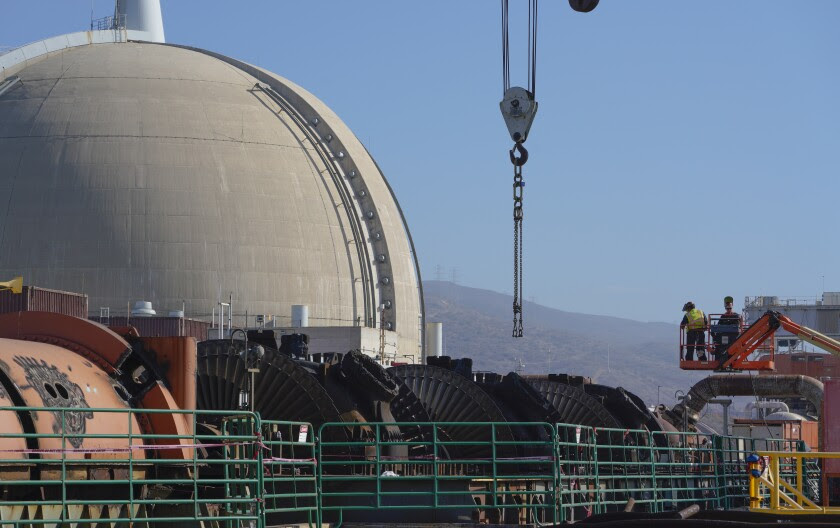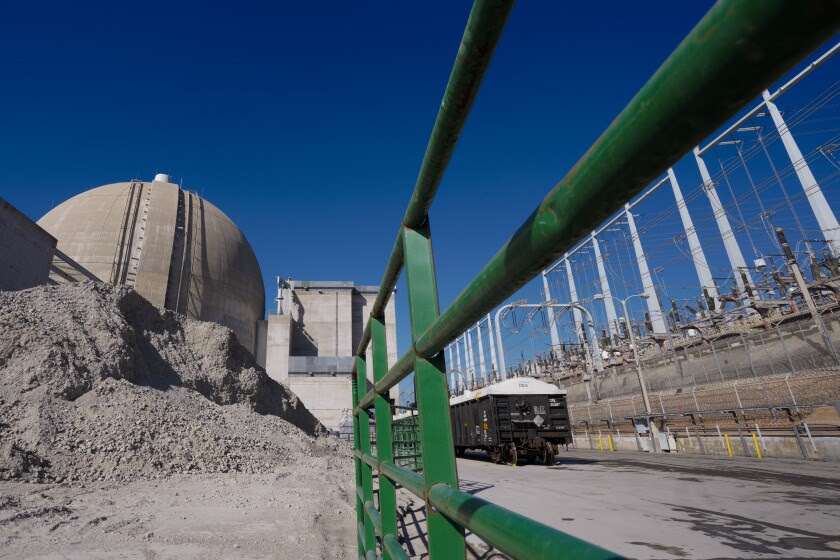[ShutSanOnofre] Dismantlement work at San Onofre nuclear facility halted after worker injury
Dismantlement work at San Onofre nuclear facility halted after worker injury

Contract worker hurts shoulder after falling about 5 feet.
APRIL 18, 2022 3:50 PM PT
Work on dismantling the San Onofre Nuclear Generating Station has been on hold for the past week after a worker on April 11 fell about 5 feet into an open space in one of the rooms primed for demolition, injuring the worker’s shoulder.
The worker was taken to a nearby hospital and released, and officials at Southern California Edison — the operators of the now-shuttered plant known as SONGS for short — put a stop to all dismantlement efforts to start an investigation. An Edison spokesman told the Union-Tribune on Monday demolition “not directly related” to the work where the incident occurred may resume later this week.
“It is important for us as an organization to fully understand what happened, what may have led up to the incident and, ultimately, how these safety events can be prevented in the future,” Edison vice president and chief nuclear officer Doug Bauder said in a statement.
The accident involved two contract workers hired by SONGS Decommissioning Solutions, the general contractor chosen by Edison to take down nearly all of the structures on the 84-acre site between Interstate 5 and the Pacific Ocean.
According to Edison, work was being done on an equipment vault, an enclosed room that is below floor-level inside the Radiological Control Building at SONGS that contained abandoned equipment that needed to be removed.
Two workers were tethered together by safety harnesses while trying to install a ventilation hose into the floor vault opening. When one worker lost balance, the other tried to catch the person from falling and fell about 5 feet into the vault, resulting in the shoulder injury.
If not restrained by the safety equipment, the workers could have fallen as far as 25 feet.
Officials with SONGS Decommissioning Solutions — a joint venture of Los Angeles-based engineering company AECOM and a Salt Lake City firm called Energy Solutions that specializes in disposing of nuclear material — immediately stopped work after the incident to start an evaluation. Edison formally extended the stand-down order, the utility spokesman said, to conduct a detailed investigation and implement potential corrective actions.
As per regulations, the incident was reported to Cal-OSHA. The accident did not require reporting to the U.S. Nuclear Regulatory Commission but Edison officials say they notified the agency’s regional office.
While demolition has been halted, other decommissioning work at SONGS continues, such as radiation monitoring and general maintenance.
This past weekend, workers completed the transfer and storing of a waste canister that was moved from the plant’s Unit 2 wet storage pool to a dry storage facility at the north end of SONGS.
The canister is the first of 12 that will be moved. Combined, the 12 will hold 125 tons of radioactive material classified as “greater than Class C low-level waste.”
The SONGS dismantlement project is in the third year of an effort estimated to take about eight years to finish and cost roughly $4.5 billion. By completion, about 1 billion pounds of equipment, components, rebar, concrete, steel and titanium will be moved out of the plant. About 80 percent of the material is considered radioactive.

The vast majority of the plant’s debris is labeled Class A waste, the lowest level of radioactive material. Most of the rubble will go to a disposal facility in Clive, Utah — primarily shipped by rail car, although some material will be transported in casks by truck. Class B and C low-level waste gets sent to a site near the town of Andrews in West Texas. Non-radioactive material goes to Arizona.
Last summer, an incident occurred in the Unit 3 containment dome but resulted in no injuries. Edison officials reported a 60-pound seismic lug from a safety injection tank fell about 18 feet to the floor after it was cut from the tank. Workers were in the area but the falling lug did not hit any of them.
Before the dismantlement project started, the Nuclear Regulatory Commission fined Edison $116,000 after a 50-ton canister filled with fuel assemblies being lowered into a newly-constructed dry storage facility in August 2018 was left suspended on a metal flange about 18 feet from the floor of its storage cavity, unsupported by rigging and lifting equipment.
The canister was eventually lowered safely but the NRC chided Edison officials for not reporting the incident within 24 hours. The NRC did not assign a civil penalty for that violation. Word of the suspended canister was not initially disclosed by Edison but by an industrial safety worker at the plant during a community meeting.
The news of the last week’s worker injury concerns Ray Lutz, national coordinator for the advocacy group Citizens’ Oversight and a frequent Edison critic.
“Everybody’s worried about, are they handling this (dismantlement) work correctly and this only makes us worry more that they are not taking proper precautions,” Lutz said. “I would be interested to see what the results of their inquiry are and I hope they have full transparency in what they release.”
Edison spokesman John Dobken said in the utility’s oversight role, “it is fundamental that we ensure a safe work environment for all employees and that is what we are doing through this pause in work and thorough review.”
Prior to the injury, SONGS Decommissioning Solutions had gone more than 2.6 million man-hours — more than a year and a half — without any event that would have resulted in workers missing work.
- Log in to post comments


